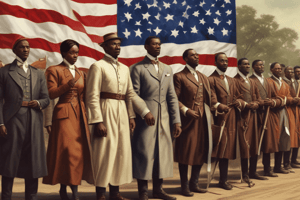Podcast
Questions and Answers
When did Reconstruction begin?
When did Reconstruction begin?
Before the war ended
Black codes, including vagrancy laws had which of the following effects? (Select all that apply)
Black codes, including vagrancy laws had which of the following effects? (Select all that apply)
- Locked many into exploitative farming contracts (correct)
- All of the answers are correct (correct)
- Criminalized black leisure (correct)
- Limited black mobility (correct)
How did the Fourteenth Amendment change American governance?
How did the Fourteenth Amendment change American governance?
Asserted the federal government's power to enforce the Bill of Rights over the authority of the states
In addition to election reform, what other major accomplishment did black delegates achieve?
In addition to election reform, what other major accomplishment did black delegates achieve?
General William T. Sherman's Special Field Order No. 15 was intended to do which of the following?
General William T. Sherman's Special Field Order No. 15 was intended to do which of the following?
Which of the following goals of freedpeople was the least successful?
Which of the following goals of freedpeople was the least successful?
How did black churches help to develop political organization in black communities? (Select all that apply)
How did black churches help to develop political organization in black communities? (Select all that apply)
Why did women's rights leaders oppose the Fourteenth Amendment?
Why did women's rights leaders oppose the Fourteenth Amendment?
What was the term for the African American ladies memorial association that arranged the mourning for Union soldiers buried in Charleston?
What was the term for the African American ladies memorial association that arranged the mourning for Union soldiers buried in Charleston?
What terrorist tactics did white southerners use to enforce racial hierarchies? (Select all that apply)
What terrorist tactics did white southerners use to enforce racial hierarchies? (Select all that apply)
Why did the Ku Klux Klan attack Allen Huggins?
Why did the Ku Klux Klan attack Allen Huggins?
What was the most common labor pattern in postbellum cotton agriculture?
What was the most common labor pattern in postbellum cotton agriculture?
The Depression of 1873 began when a prominent business declared bankruptcy. What was the name of that company?
The Depression of 1873 began when a prominent business declared bankruptcy. What was the name of that company?
The Compromise of 1877 did which of the following?
The Compromise of 1877 did which of the following?
What did President Andrew Johnson offer to Southerners?
What did President Andrew Johnson offer to Southerners?
What did the Thirteenth Amendment accomplish?
What did the Thirteenth Amendment accomplish?
What did the Fourteenth Amendment allow?
What did the Fourteenth Amendment allow?
What was the role of the Freedmen's Bureau?
What was the role of the Freedmen's Bureau?
What was the outcome of the impeachment of President Andrew Johnson?
What was the outcome of the impeachment of President Andrew Johnson?
In the Compromise of 1877, what happened regarding Republican candidate Rutherford B. Hayes?
In the Compromise of 1877, what happened regarding Republican candidate Rutherford B. Hayes?
What were Redeemers?
What were Redeemers?
After the collapse of Reconstruction, how did most Southern whites feel towards civil rights?
After the collapse of Reconstruction, how did most Southern whites feel towards civil rights?
What were Scalawags?
What were Scalawags?
What were Carpetbaggers?
What were Carpetbaggers?
What did the Fifteenth Amendment grant?
What did the Fifteenth Amendment grant?
Flashcards are hidden until you start studying
Study Notes
Reconstruction Era
- Began before the Civil War ended, setting the stage for post-war recovery and reintegration.
Black Codes
- Enforced laws like vagrancy that limited black mobility and exploited labor.
- Aimed to criminalize black leisure activities, effectively restricting rights of freedpeople.
Fourteenth Amendment
- Empowered the federal government to uphold the Bill of Rights against state infringement.
- Key change in governance promoting civil rights for all citizens.
Political Involvement
- Black delegates played a crucial role in revising southern state constitutions post-war.
- Major achievement included establishing public school systems for education access.
General Sherman’s Order
- Specialized land policy known as Special Field Order No. 15 allocated land in Georgia and South Carolina to freedpeople.
Freedpeople’s Goals
- Efforts to gain access to land were largely unsuccessful compared to other aspirations.
Role of Black Churches
- Provided spaces for political gatherings and fostered leadership in community organizing.
- Helped empower women and develop political frameworks within black communities.
Women's Rights and Fourteenth Amendment
- Women’s rights leaders rejected the amendment because it was the first to use the term "male" in the Constitution.
Memorial Associations
- The African American Ladies Memorial Association, also known as Patriotic Association, organized commemorations for Union soldiers.
Terrorist Tactics
- White southerners employed violence against black individuals, targeting their economic and social advancements through intimidation and physical attacks.
Ku Klux Klan Actions
- Targeted Allen Huggins, a white sheriff advocating for black civil rights, demonstrating their hostility towards allies of freedpeople.
Labor Patterns
- Sharecropping emerged as the predominant labor system in the postbellum cotton industry, reflecting a cycle of indebtedness among black farmers.
Depression of 1873
- Triggered by the bankruptcy of Jay Cooke and Company, this economic downturn significantly impacted the Reconstruction efforts.
Compromise of 1877
- Resulted in the withdrawal of federal troops from the South, facilitating the end of Reconstruction and leading to the Republican Party's concessions.
President Andrew Johnson
- Offered amnesty to Southerners who pledged loyalty, indicating a lenient approach towards former Confederates.
Key Amendments
- Thirteenth Amendment abolished slavery, profoundly changing social and legal conditions for African Americans.
- Fourteenth Amendment ensured equal protection under the law, reinforcing civil rights.
- Fifteenth Amendment granted voting rights to formerly enslaved individuals, furthering political inclusion.
Freedmen's Bureau
- Provided essential education and aid to newly freed slaves, helping with their transition to freedom.
Johnson's Impeachment
- The politics of Reconstruction led to Andrew Johnson's impeachment by the House, though he was acquitted by the Senate.
Post-Reconstruction Landscape
- The Compromise of 1877 marked a significant shift in power, with Rutherford B. Hayes’s presidency coinciding with a withdrawal of support for Reconstruction efforts.
Redeemers
- Southern Democrats who claimed to rescue the South from Northern control and perceived black governance after the Civil War.
Southern Hostility
- Post-Reconstruction, most Southern whites resisted advancing civil rights and social equality for African Americans.
Scalawags and Carpetbaggers
- Scalawags were Southern white Republicans viewed as traitors to their region.
- Carpetbaggers were Northern Republicans who moved to the South during Reconstruction, often viewed with suspicion by locals.
Studying That Suits You
Use AI to generate personalized quizzes and flashcards to suit your learning preferences.




